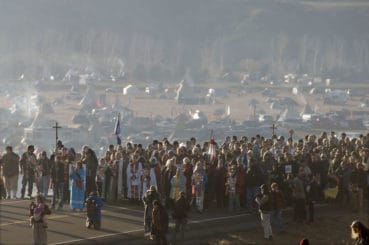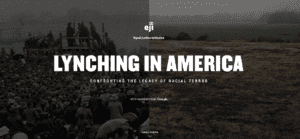
By Sung Yeon Choimorrow
This is not a piece about Standing Rock, the Dakota Access Pipeline (DAPL), and the water protectors. This is a reflection to expand upon the narrative of what happened during the clergy action visit to Standing Rock on November 3rd, 2016.
A call to action
Last month, I joined with over 400 other clergy members in response to a call for clergy to join in a solidarity action with the Oceti Sakowin and their struggle to protect water.
Central to the efforts of the Oceti Skaowin people is a ritual of sacred fire. When I arrived at the camp, Adrianne, the sacred Fire Keeper, greeted my friends and me and thanked us for being there. He then explained the significance of the sacred fire, that it had been going since April, and how we needed to understand it.
Adrianne emphasized that it was an important element of ritual to keep the fire pure. This meant that only Fire Keepers (those designated by elders) are permitted to tend the fire. To respect the sacred fire, everyone who entered the camp was told that they should not take photos of the fire, or throw anything into the fire, aside from sage and tobacco while offering prayer.
By the end of my visit, it was clear to me that every person who entered the camp was informed of the power and importance of the sacred fire, and would know how to honor its role if they sought out the hosts at the camp. Yet I was deeply discouraged by how other clergy members were ignorant to these guidelines.
A lesson in solidarity tourism
The previous evening, while we were all gathered for a clergy action orientation, the coordinator for the event, Father John Floberg, told us that the next day would start with a ceremony at the sacred fire. It would be an historic moment because white Christians would be repudiating the Doctrine of Discovery to Native elders (and apparently this has never been done before). In addition, the organizers of the ceremony were given special permission to take pictures near the sacred fire to document this historical event.
Given the knowledge that the sacred fire was not to be photographed, and photography in the general area was not allowed, why did Father Floberg even request permission? Why did the clergy feel so entitled as to think their needs were more important than those of the community we came to support? That this request was both offered and accepted is a reminder of the colonial mentality of exceptionalism and justification. It was not a request that honored the Oceti Sakowin, who were hosting us.
Why did the clergy feel so entitled as to think their needs were more important than those of the community we came to support? This was not a request that honored the Oceti Sakowin.
At the ceremony the next morning, all I could see were cameras and people swarming around the sacred fire. What was supposed to be a sacred ceremony to express solidarity with the oppression facing the Oceti Sakowin turned into what felt instead like a celebrity staging.
A self-serving narrative
Whose needs were truly being served through this ceremony of repudiation of the Doctrine of Discovery? If it was really for the Native people, if we came to honor their tradition, we would not have taken pictures. The needs of the clergy, not the community, and the need to highlight what the clergy were doing for the community, was prioritized.
After the ceremony, the clergy group walked towards the bridge where our prayer vigil was to take place. But we walked alone; not many people from the camp were with us. The giant cross at the front of our procession felt more like a crusade than an action of solidarity. The reflections from clergy at the vigil seemed to mainly focus on why they, as individuals, were there; it was an exercise of talking at people instead of listening to them.
I left early to return to the Oceti Sakowin camp. It was clear that most people didn’t understand what the clergy were there for, or why they had a ceremony, and that most clergy had not connected with the Oceti Sakowin community. It was then announced across camp that the clergy were heading to Bismarck to the State Capitol.
At Bismarck, 14 clergy members were arrested, which became the dominant narrative that emerged from the whole action. The story was no longer about the needs of the community or water protection.
At Bismarck, 14 clergy members were arrested, which became the dominant narrative that emerged from the whole action. The story was no longer about the needs of the community or water protection.
Displayed versus expressed solidarity
My main discomfort with the way the clergy group behaved was that it seemed more important to display their solidarity rather than express solidarity. When someone is concerned about displaying solidarity, they make the effort about themselves. They control the narrative and ensure their experience is validated. They make the story about themselves, and not about the people they are in solidarity with.
Expressing solidarity is to be present, specifically in the ways the people you’re standing in solidarity with want you to be present. It requires more listening than talking. It requires getting to know the stories of those who are oppressed. It requires not having preconceived notions of what is helpful or effective. It requires not having a pre-set agenda of what one wants to “get out of the trip.” Expressing solidarity means letting the needs of the community outweigh the needs of those providing support.
What I observed was solidarity tourism. What I witnessed was exploitation colonialism. From documenting and photographing the ceremony at the sacred fire, to the clergy rally, to getting arrested in Bismarck, the narrative was twisted to become more about the clergy than those who were protecting water.
Words for future solidarity action
The Oceti Sakowin camp is set up to receive large groups of people, with orientation every day. If you go, go straight to the camp and connect with the Native leaders directly. Go with the mentality of being useful, and not with a preconceived notion of what you believe will be a significant contribution. Go with an open heart to express your solidarity, rather than display your solidarity. That may mean you spend four days chopping onion and garlic and not getting arrested. It may mean helping clean up around the camp, instead of taking photos. It may mean meeting needs that are not your own. These are expressions of true solidarity.
For information about Standing Rock and their struggle to protect water, please check Native news sources such as IndianCountryNews.com. I would also encourage everyone to read the Standing Rock Allies Resource Packet.


